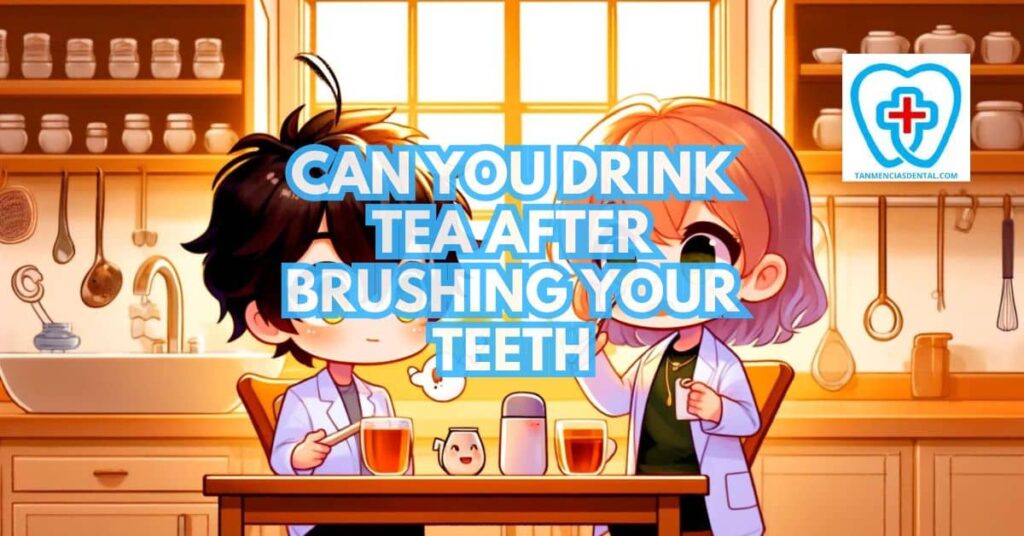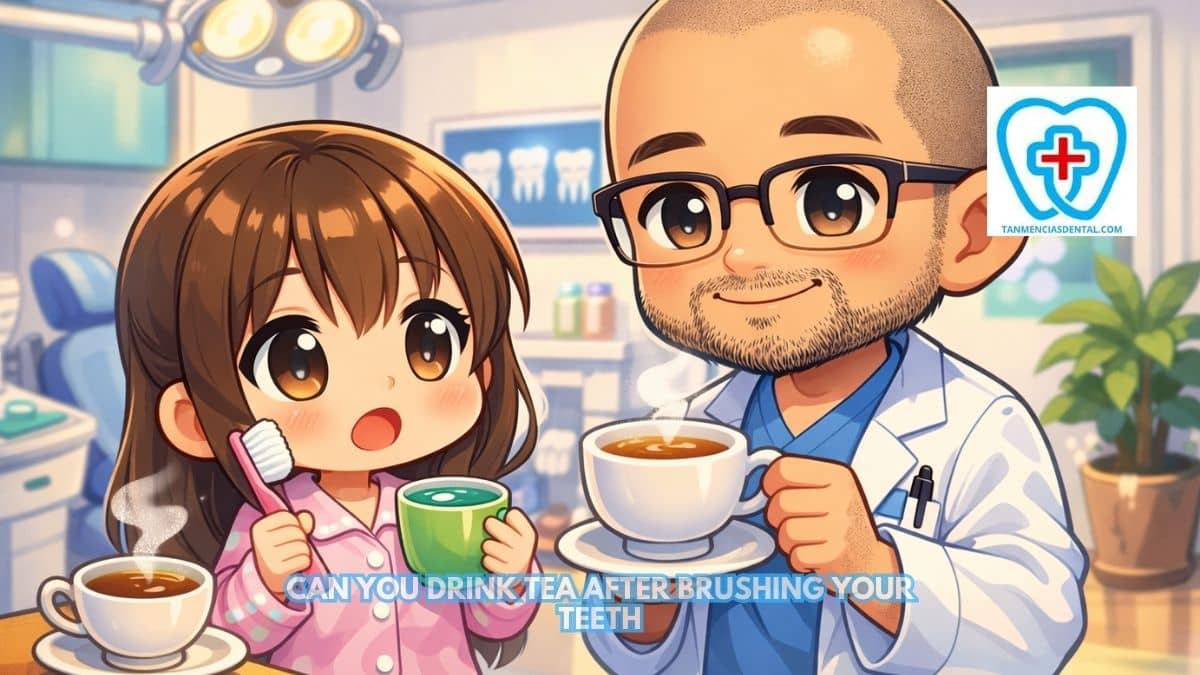Many people ask, can you drink tea after brushing your teeth, especially as tea is part of a daily routine.
We often brush to protect our teeth, but what we drink next can affect how well that protection lasts.
Tea contains natural acids and tannins that may weaken enamel or cause stains when teeth are most sensitive.
Right after brushing, fluoride needs time to stay on the teeth and do its job.
Drinking tea too soon can reduce that benefit and lower the protection brushing provides.
We’ll explain how timing, fluoride, and tea choices work together so you can care for your teeth without giving up tea.
1. The Science Behind Toothpaste: Understanding Fluoride’s Role
Fluoride, a key ingredient in most toothpastes, helps prevent tooth decay and strengthens enamel by aiding in its remineralization.
This process makes the enamel more resistant to acid attacks from bacteria.
After brushing, it’s important to allow fluoride enough time to work on your teeth.
If you drink tea right after brushing, the tea can wash away some of the fluoride, reducing its effectiveness.
To avoid this, rinse your mouth with water after brushing and wait about 30 minutes before you drink the tea.
This allows your saliva to naturally balance the mouth’s pH and helps fluoride fully protect your teeth.
By understanding fluoride’s role, you can improve your oral care routine and protect your teeth more effectively.
🦷 Will Undergoing Oral Prophylaxis Finally Help Eliminate My Bad Breath?
2. Why You Should Avoid Rinsing Right After Brushing
After brushing with fluoride toothpaste, many dentists recommend spitting out the foam but not rinsing with water right away.
Rinsing immediately can wash away the fluoride that needs time to stay on the teeth and protect the enamel.
When fluoride remains on the tooth surface, it continues to strengthen enamel and reduce the risk of decay.
For best results, it is helpful to wait about 30 minutes before rinsing or drinking anything.
During this time, saliva helps spread fluoride evenly and balance the mouth’s natural pH.
If rinsing feels necessary because of taste or mouth sensitivity, using a small sip of water to gently swish is a better option than a full rinse.
This approach helps keep more fluoride on the teeth while still improving comfort.
🦷 Are Bananas Good For Your Teeth? Understanding Their Impact on Oral Hygiene
3. Chemical Reactions Worth Noting: Tea and Toothpaste Interactions
When tea comes into contact with a freshly brushed mouth, it can interfere with how fluoride works.
Tannins in tea may bind with fluoride and reduce its ability to protect the enamel on your teeth.
Tea also has its own pH level, which can change the balance inside the mouth.
If the mouth becomes more acidic, fluoride may not work as well as intended.
This can make the enamel on your teeth more vulnerable right after brushing.
Understanding these reactions highlights why waiting before drinking tea can help fluoride stay effective and better protect your teeth.
🦷 Can Oral Prophylaxis Provide Natural Teeth Whitening Effects?
4. Experimenting with Timing: The Best Moments for Tea
Finding the right time to enjoy tea after brushing often takes some trial and observation.
Many dental experts suggest waiting at least 30 minutes before you eat or drink after brushing, especially when tea is involved.
This waiting period gives fluoride time to stay on the teeth after brushing and strengthen the enamel.
It also allows saliva to balance the mouth’s pH, which lowers the risk of enamel wear.
Because tea contains acids and tannins, it is best to avoid drinking tea after brushing teeth until the enamel has had time to recover.
Some people may notice that their teeth after brushing feel more sensitive, which can be a sign to wait a little longer.
Toothpaste type, tea strength, and personal oral health can all affect how teeth respond.
By adjusting timing and paying attention to how your mouth feels, you can find a routine that supports strong and healthy teeth.
🦷 How Often Should I Get A Cleaning To Maintain Optimal Gum Health?

5. Tea Benefits That Complicate the Decision
Tea is not just a comforting beverage; it boasts a variety of health benefits that make the decision to wait after brushing more nuanced.
Rich in antioxidants, tea can help reduce inflammation and fight bacteria in the mouth, potentially lowering the risk of cavities and gum disease.
Green tea, in particular, has been shown to have positive effects on oral health, including reducing bad breath and the growth of harmful oral bacteria.
These benefits suggest that drinking tea could complement dental hygiene practices rather than detract from them.
However, the timing of tea consumption still plays a crucial role in ensuring these benefits do not interfere with fluoride’s protective effects on teeth.
🦷 Why Oral Prophylaxis Matters for Your Oral Health
6. The Impact on Toothpaste’s Benefits: Immediate vs. Delayed Tea Consumption
Drinking tea right after brushing can lead to a significant reduction in the effectiveness of fluoride, a crucial element in toothpaste that helps prevent dental decay.
The immediate consumption of tea can wash away fluoride before it has had the chance to fully interact with tooth enamel, thus diminishing its protective capabilities.
On the other hand, delaying tea consumption allows fluoride to adhere to and strengthen the enamel, enhancing its resistance to decay.
Studies suggest that waiting at least 30 minutes after brushing to drink tea maximizes fluoride’s benefits, making this delay a recommended practice for dental health.
This strategic timing ensures that the protective layer fluoride forms on the teeth remains intact, providing long-lasting benefits.
🦷 Why Is Professional Tartar Removal Necessary For Preventing Gum Disease?
7. Integrating Tea into Your Oral Hygiene Routine
Creating a balanced oral hygiene routine that includes both the benefits of fluoride toothpaste and the enjoyment of tea requires thoughtful integration.
One approach is to schedule tea consumption well before brushing or to wait a significant time after brushing, ensuring that fluoride has the opportunity to act effectively.
For those who prefer tea at specific times, adjusting brushing times accordingly can help maintain the effectiveness of both practices.
Incorporating fluoride mouthwash into the routine can also offer an additional layer of protection, especially if tea is consumed shortly after brushing.
The goal is to enjoy the benefits of both tea and toothpaste without compromise by understanding and respecting the interaction between the two.
🦷 Can Dental Plaque Be Removed At Home, Or Do I Need A Professional?
8. Tea Types and Their Varied Effects on Dental Health
Not all teas affect dental health in the same way, and some are more likely to cause problems than others.
Black tea contains higher levels of tannins, which are known to create tea stains and can stain your teeth more easily.
These dark pigments can stick to the tooth surface, leading to staining over time, especially with frequent drinking.
Green tea has fewer tannins and more catechins, which may help reduce harmful bacteria in the mouth.
Because of this, green tea is often less likely to stain your teeth compared to black tea.
Herbal teas vary widely, and some may be more acidic, which can weaken enamel if consumed often.
Acidic drinks can also make it easier for stains to form on the teeth.
Choosing lighter teas with lower tannin and acid levels can help reduce the risk of long-term discoloration and enamel damage.
🦷 The Ultimate Guide to Choosing the Best Toothbrush to Whiten Teeth
9. How Additives in Your Tea Can Affect Your Dental Health
Adding various ingredients to your tea can have significant effects on your oral health.
Sugar and sweeteners are common additives that can increase the risk of cavities by providing food for bacteria that produce harmful acids in the mouth.
Lemon and other citrus fruits introduce acidity, which can erode tooth enamel over time, especially when consumed frequently or in large quantities.
Milk and dairy products added to tea can supply calcium that helps remineralize enamel, but the lactose sugar present may also contribute to tooth decay if not used in moderation.
Honey, while a natural alternative to sugar, still contains sugars that can feed oral bacteria and promote cavity formation.
To protect your teeth, consider using healthier sweetening options or limiting the amount of additives you include in your tea.
🦷 Going to the Dentist After a Long Time

10. Practical Tips for Tea Lovers Who Prioritize Oral Health
For tea enthusiasts keen on maintaining optimal oral health, there are practical ways to enjoy tea without compromising dental hygiene.
Firstly, consider using a straw for drinking tea to minimize direct contact with teeth, especially if you consume tea shortly after brushing.
Rinsing the mouth with water after drinking tea can help neutralize acids and reduce potential staining and fluoride interaction.
Choosing teas with lower acidity and waiting a while after brushing before indulging in a cup can also be beneficial.
Implementing these small, manageable adjustments allows for the enjoyment of tea without significantly impacting the protective benefits of fluoride toothpaste.
🦷 When Does A Dentist Recommend A Deep Cleaning Over A Standard Checkup?
11. The Verdict: Is Drinking Tea After Brushing Your Teeth Advisable?
Considering the evidence and expert advice, drinking tea immediately after brushing teeth is not ideal due to the potential interference with fluoride’s effectiveness.
However, with proper timing and precautions, it is possible to enjoy tea without compromising oral health.
Waiting at least 30 minutes after brushing before drinking tea is a recommended compromise that balances oral health priorities with the enjoyment of tea.
This approach ensures that fluoride has ample time to act on the teeth while still allowing for tea consumption within a reasonable timeframe.
The verdict leans towards a cautious yet flexible approach, emphasizing the importance of timing in oral health routines.
🦷 Endodontic And Periodontal Treatment in Marikina
12. Expert Opinions and Research on Tea Consumption and Oral Health
Dental health professionals and researchers largely agree that the timing of tea consumption in relation to brushing teeth can influence oral health outcomes.
Research shows that the best protection for teeth from fluoride occurs when tea or other drinks are not consumed right away after the treatment.
Research also suggests that the benefits of certain teas, like green tea, on oral health can be a positive addition to one’s oral hygiene routine when consumed wisely.
Experts recommend waiting a period after brushing before drinking tea to allow fluoride to effectively protect teeth.
This consensus underscores the importance of integrating scientific findings and professional advice into daily oral health practices.
🦷 Full-Spectrum Dental Care in Marikina
👨⚕️ Conclusion
Navigating the enjoyment of tea and maintaining oral health requires a balance that respects both the benefits and potential drawbacks of these practices.
By incorporating strategic timing and mindful consumption habits, individuals can protect their dental health while still enjoying their favorite teas.
Understanding the interplay between tea components and fluoride, along with applying practical tips for minimizing adverse effects, enables tea lovers to uphold their oral hygiene without sacrifice.
Embracing a routine that accommodates both the pleasures of tea and the necessities of dental care demonstrates a commitment to comprehensive health.
Ultimately, informed choices, grounded in research and expert guidance, pave the way for a harmonious relationship between tea consumption and oral health.
❔ FAQs
1. Can you drink tea right after brushing your teeth?
Drinking tea right after brushing is not ideal because fluoride needs time to stay on the teeth.
Tea can wash away fluoride before it fully protects the enamel.
This can lower the benefit of brushing.
Waiting about 30 minutes helps fluoride do its job.
2. How long should you wait to drink tea after brushing?
Most dental experts suggest waiting at least 30 minutes after brushing before drinking tea.
This gives fluoride time to strengthen the enamel.
It also allows saliva to balance the mouth’s pH.
This waiting period helps reduce staining and enamel wear.
3. Does rinsing with water after brushing affect fluoride?
Yes, rinsing right away can remove fluoride from the teeth.
Fluoride works best when it stays on the tooth surface for a while.
Spitting out the foam without rinsing helps keep fluoride active.
If rinsing is needed, a small sip of water is a better choice.
4. Is green tea safer for teeth than black tea after brushing?
Green tea usually has fewer tannins than black tea.
Lower tannin levels mean less risk of staining and less interaction with fluoride.
Green tea also has compounds that support oral health.
Even so, timing still matters after brushing.
5. Can adding milk to tea reduce tooth staining?
Milk may help reduce staining by binding with some tannins in tea.
It also provides calcium, which supports enamel strength.
However, milk contains natural sugars that can affect teeth if used often.
Moderation and good timing remain important.
6. What should you do if you have already drunk tea too soon after brushing?
If you drank tea too soon, rinse your mouth with plain water to reduce acids.
Avoid brushing again right away because enamel may be softer.
Waiting before brushing helps prevent damage.
Returning to your normal routine at the next brushing is usually enough.
😁 Self-Promotion
Experience the optimal blend of professional care and welcoming ambiance at Tan-Mencias Dental Clinic, your trusted dental partner in Parang, Marikina City.
Our dedicated team is here to ensure your visit is comfortable, informative, and tailored to meet all your dental needs.
Whether you have questions, need advice, or are ready to schedule your next appointment, reaching out to us is easy and convenient.
Feel free to call us at 0917-145-1074, send a message through our Facebook page, or fill out the form on our site to get in touch.
We’re looking forward to bringing a healthy smile to your face with our expert dental care!

